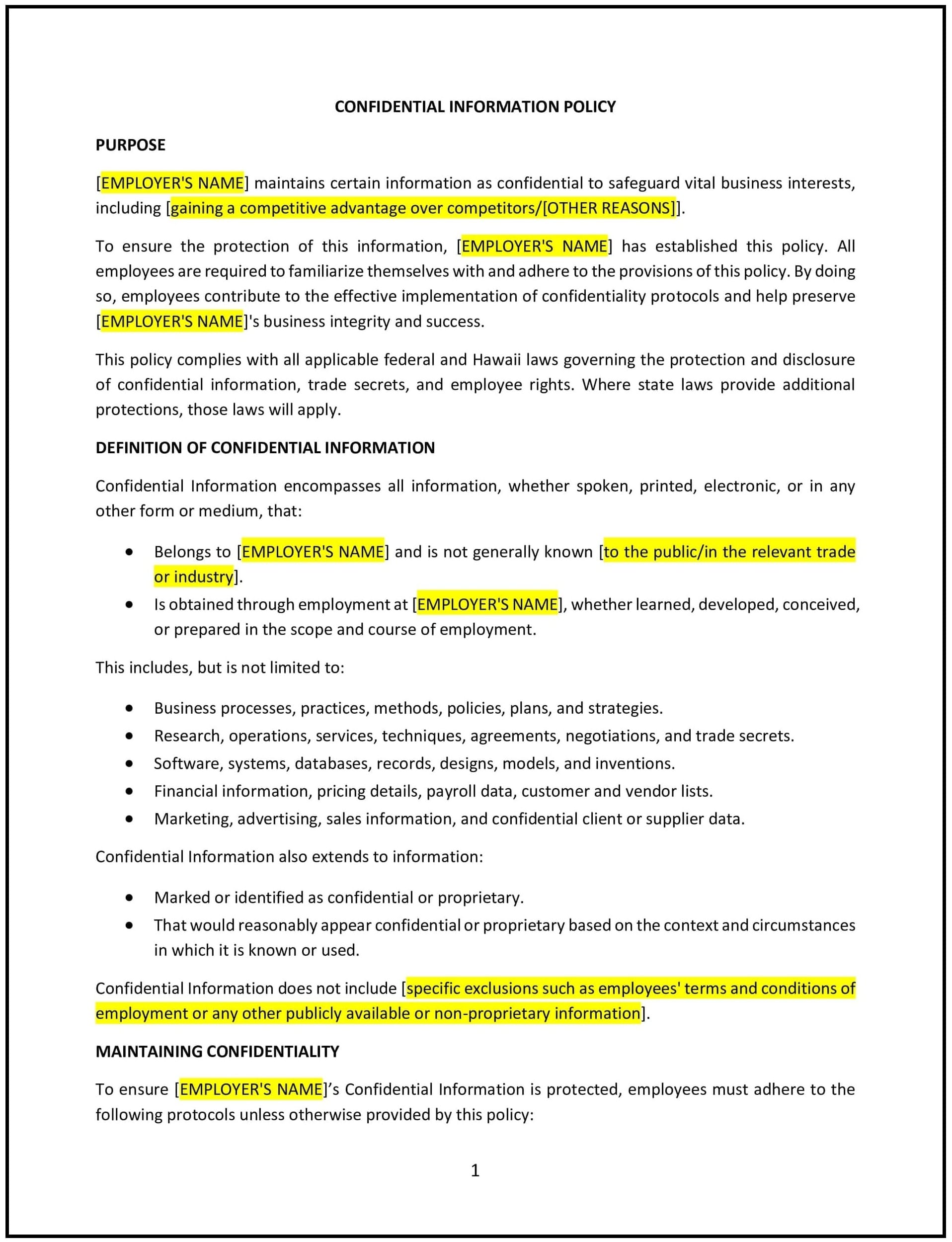Confidential information policy (Hawaii): Free template
Got contracts to review? While you're here for policies, let Cobrief make contract review effortless—start your free review now.

Customize this template for free
Confidential information policy (Hawaiʻi)
A confidential information policy helps Hawaiʻi businesses protect sensitive data, such as trade secrets, customer information, and employee records, from unauthorized access or disclosure. This policy outlines guidelines for handling, storing, and sharing confidential information, while addressing Hawaiʻi-specific legal and cultural considerations. It is designed to safeguard business assets, maintain customer trust, and promote a culture of accountability.
By implementing this policy, businesses in Hawaiʻi can reduce the risk of data breaches, protect intellectual property, and ensure compliance with privacy laws.
How to use this confidential information policy (Hawaiʻi)
- Define confidential information: Specify the types of data considered confidential, such as financial records, customer details, employee information, or proprietary business processes.
- Establish handling procedures: Provide guidelines for accessing, storing, and sharing confidential information, including password protection, encryption, and secure file-sharing methods.
- Limit access: Restrict access to confidential information to authorized personnel only and implement role-based access controls.
- Address third-party sharing: Outline procedures for sharing confidential information with vendors, contractors, or partners, including non-disclosure agreements (NDAs).
- Train employees: Educate employees on the policy’s guidelines, including their responsibilities for protecting confidential information and recognizing potential risks.
- Monitor compliance: Regularly review access logs, conduct audits, and address any breaches or policy violations promptly.
- Communicate the policy: Share the policy with employees during onboarding and through regular reminders, such as emails or training sessions.
- Review and update the policy: Regularly assess the policy’s effectiveness and make adjustments as needed to reflect changes in technology, laws, or business needs.
Benefits of using this confidential information policy (Hawaiʻi)
This policy offers several advantages for Hawaiʻi businesses:
- Protects sensitive data: Clear guidelines help prevent unauthorized access, disclosure, or misuse of confidential information.
- Reduces risk of data breaches: A structured policy minimizes the likelihood of breaches, which can result in financial losses or reputational damage.
- Maintains customer trust: Safeguarding customer information demonstrates a commitment to privacy and builds trust with clients.
- Safeguards intellectual property: Protecting trade secrets and proprietary information ensures the business remains competitive.
- Promotes accountability: Employees understand their responsibilities for handling confidential information, reducing the risk of accidental or intentional breaches.
- Aligns with legal requirements: The policy helps businesses comply with Hawaiʻi privacy laws and federal regulations, such as the Health Insurance Portability and Accountability Act (HIPAA) or the General Data Protection Regulation (GDPR).
Tips for using this confidential information policy (Hawaiʻi)
- Communicate the policy effectively: Share the policy with employees during onboarding and through regular reminders, such as emails or training sessions.
- Provide training: Educate employees on the policy’s guidelines, including how to handle confidential information and recognize potential risks.
- Use technology: Implement tools such as encryption, firewalls, and access controls to protect confidential information.
- Monitor compliance: Regularly review access logs, conduct audits, and address any breaches or policy violations promptly.
- Be transparent: Clearly explain the policy’s purpose, benefits, and expectations to employees to build trust and cooperation.
- Review the policy periodically: Update the policy as needed to reflect changes in technology, laws, or business needs.